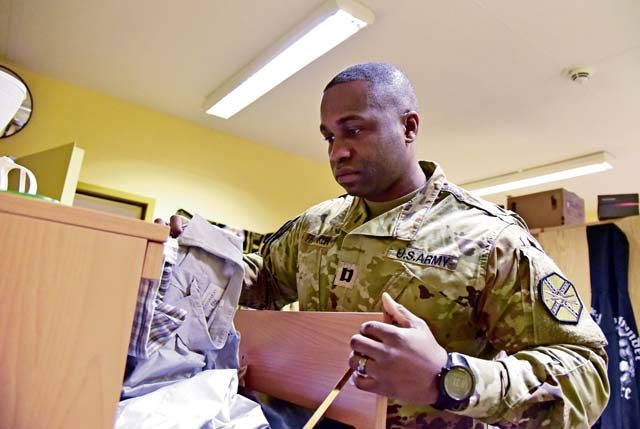
What may look like a messy room could possibly hide clues to alcohol or drug problems, if you know where to look.
U.S. Army Garrison Rheinland-Pfalz Army Substance Abuse Program offers “Mock Barracks Health and Welfare” and “Hidden in Plain Sight” training to help unit leaders and concerned community members look for clues to potential drug, alcohol and behavioral issues in a simulated barracks room or teen bedroom.
ASAP and Army Criminal Investigation Division Drug Suppression Teams at Baumholder and Kaiserslautern teach participants how everyday items in plain sight can be covertly used for drug or alcohol abuse. They also teach people how to search for hidden drugs and signs of high risk behaviors, said Leslie Sweeney, ASAP program manager and Community Ready and Resilient integrator.
“Mock Barracks Health and Welfare training is geared for E-6s and above serving in supervisory or leadership positions who would conduct the health and welfare inspections,” Sweeney explained. “The class provides information on local drug trends and also offers judge advocate general approved guidance regarding the legalities of what can be checked.”
First, participants receive classroom training focusing on how to conduct an inspection, drug trends and what to look for. Then, they put their training into practice by inspecting a mock barracks room containing observable and concealed drugs, signs of alcohol abuse and indicators of high risk behaviors or items of concern. Afterward, they have a discussion, provide contact information for local helping agencies and ask any remaining questions.
For Capt. Willie Franklin, company commander of Headquarters, Headquarters Company USAG Rheinland-Pfalz, performing these inspections are a part of his duties.
“The purpose of a health and welfare inspection is to determine and ensure the security, military readiness and good order and discipline of a unit,” he said “Of course, if evidence of a crime is discovered, it will be seized and appropriate legal action will be taken.”
As a commander, he examines rooms for proper standards of readiness, sanitation and cleanliness, and within legal limits, checks for controlled substances, unregistered personal weapons and other unauthorized items within barracks.
Franklin said the training is beneficial to ensuring Soldiers’ living spaces are as clean and safe as possible.
“This training is vital for all leaders — especially company-level leaders,” the HHC commander said. “Typically, we conduct these inspections, so being exposed to a typical room with items that are hidden in plain sight helps sharpen our focus. I cannot stress enough just how helpful this is.”
Parents, educators and any interested community members will receive similar training with “Hidden in Plain Sight” training, said Susanna Leist, USAG RP Prevention coordinator.
“The props in the room may change, but the delivery and focus are different,” she said. “Like the other training, the information is provided up front, and then the participants are given an opportunity to put their learning into practice.”
For this interactive training, ASAP partnered with Adolescent Substance Abuse Counseling Services, Department of Defense Education Activity, school liaisons officers, drug suppression teams and the garrison civilian misconduct office to create a hands-on opportunity for educators, parents and interested community members, Leist said. The inaugural Hidden in Plain Sight classes take place at Kaiserslautern High School, Feb. 13.
“We were loaned a classroom to set up a teen room and host two sessions to target the community. The training is an hour and a half with a 30 minute question-and-answer session with a panel of community resource experts,” Leist said. “The community involvement aspect of this program is huge, and the organizations are coming together to provide this great opportunity.”
The classes are gaining traction in the community with 80 Soldiers receiving 164 hours of training since ASAP began the program in March.
“We’re hoping to reach as many people as possible to keep our community safe,” Sweeney said. “Both these efforts support wellness for our ready and resilient community.”
Taking care of Soldiers and families is a primary concern for USAG RP Commander Col. Keith Igyarto, and these classes help him do that.
“It’s one thing to talk about what to look for; but it’s another to actually see it and be able to recognize the possible indicators of potential danger firsthand. There’s no substitute for eyes-on awareness of what to look for and how to spot it,” the commander said. “This is such a great program to be able to help our Soldier leaders and our community parents in providing an educational tool to minimize safety and health risks to those for whom we are responsible.”
To schedule Mock Barracks Health and Welfare training or the Hidden in Plain Sight training people can call 493-4907, 493-4909, 531-3141 or visit the ASAP office in Bldg. 2886 on Pulaski Barracks or ASAP at Clinic Kaserne, Baumholder.


